Interview #65: Scorecards and Scorekeeping
Liz Thompson, Orioles fan and Diamond Scorecard Designs
Liz Thompson is a Maryland resident and passionate baseball fan. Her baseball zeal has endured through knee injuries, bad Orioles teams and getting cut from softball teams. One of the things that she’s most into is keeping score at games, which she says keeps her focused on the game and keeps her ADHD from distracting her. It led to her current side project, Diamond Scorecard Designs. She used her computer graphic design background to create a layout that suit her style, and from there has tinkered and fiddled with it to suit different types of scorers: fans, press, broadcasters, people who like smaller sheets, people with impaired vision, etc.
You can find more about her scorebooks and work at her website: Diamond Scorecard Designs. You can also follow her on Bluesky: @lizzierie. We talked about a lot of baseball, the steroid era, and discussed our different scorekeeping methods.
Note: Some answers have been lightly edited for length and clarity. Interview was conducted on 6/16/25
Growing up with baseball
How long did you play softball for?
Kindergarten up until 11th grade. I was cut from varsity. But I kept score. I loved our coach, and so I was part of the team, just I didn't play. I played a year of club ball in college, it was not a very competitive club. We had a girl who had never played before on our team, so we were literally teaching her how to play softball while we were in college.
But yeah, playing pretty much forever. I've had bad knees my entire life. My first knee injury was sliding into home and I had to give up catching after that. Catching was my favorite position. I was afraid to slide since 7th grade on, I just was terrified of sliding because it was the first time I injured my knee.
What attracted you to catching of all positions? That's the hardest one to do.
I loved it. It was the one that I enjoyed the most. I did not like outfield. I think part of that was because of our age group and the fact that I was so ADHD, standing in the outfield, just doing nothing, was not me. I would say after catching that it was either shortstop or third base.
So you got cut, but you stuck around. What were the emotions like senior year?
It hurt. I was partially cut in JV my sophomore year. There was just way too many girls. My freshman year, no one got cut, and then my sophomore year, about four or five of us did. But I loved the sport and I wanted to keep playing. I knew rec league at that age was not well populated. I loved the coach. I went up to him and I was like, hey, can I keep practicing? I was like the team manager, so I practiced with them and then I kept score. Then when I got cut again the next year, I would say a lot of that was defense, I was more of a hitter than I was defender, especially after I had to stop catching. Rosie, our coach, she was loving it. She actually never wanted me to graduate because I kept the perfect book for her. That was her words.
Your parents were baseball fans?
So my mom, her little fun fact is she was born on the same street in the same year as the Orioles. She was born in 1954 on the same exact street as Memorial Stadium. She moved out to the Midwest when she was in high school, my grandfather was a union guy, so he got moved out there and because it was late 60s, early 70s, she couldn’t really follow the Orioles. They apparently did get some radio broadcasts. She was telling me about that, but she slightly adopted the White Sox until she met my father.
My dad is from the northern suburbs, and so he was a Cubs fan, went to games with his uncle. His uncle actually was alive for the 1907 and 1908 World Series, so he may not have lived for 2016, but he saw a Cubs World Series in his life. But that was who my dad got it from was his uncle. My oldest brother, he says he's from Chicago, but he was six weeks old when they moved to Maryland. He is a diehard Cubs fan. He watches every game from Ireland. So I watched a lot with him growing up. My dad has his own business and so he worked a lot. I got to watch a lot of games with my brother. There's nine years between us, so he taught me a lot of watching games on TV.
What was it about baseball that made you fall in love at first and keeps you as a fan now?
I was trying to think about that the other day. I don't have a lot of strong memories from when I first learned the game. I was pretty young, I was like 4 or 5 when I first really got into things because I do remember the home run race. I was 5 years old when the home run race happened and Sammy Sosa was my favorite player as a kid; I did a book report on him in elementary school. I do remember that excitement, but I don't have solid memories of it. I just remember the feelings from that season.
That kind of got me hooked, I would say. I played T-ball and then softball. I watched my brothers play baseball and my sister played softball. It just stuck with me and then I always was wanting to learn more. It was 7th grade, we had to do a paper on something about the 90s, and so I wrote about baseball in the 90s, which was steroids. So in middle school I wrote my first paper on the steroid era. I read Jose Canseco's book for that too, and I was way too young to have read that. My 8th-grade Science Fair project was the difference between wood and metal bats. I actually made my other brother hit 40 baseballs for me so I could measure the distance with four different bats.
You’re into the nerdy side of baseball.
I'm a pretty big nerd. I would also say the storytelling; my degree is in public relations. So the communication side, storytelling, and stuff like that. I was good at math and science, and so I disappointed my father by not becoming an engineer. Math is easy. I had teachers in the Communications department who just were like, why are you in our department if math is easy for you? Because I don't want to do that.
The papers I wrote in college, my communication theory paper and my communication ethics paper, were both on the steroid era. The theory paper was about the four theories of the press, so the way that the media served as a watchdog for the league, because it was a problem long before it was even being written about. It leads into my ethics paper about how the press was complicit as well. But once they started reporting on it, and some investigative reporters outside the beat started reporting on it, that was when MLB came in. It was like, OK, we should probably do something.
What are your thoughts on the steroid era?
Honestly, I would say it was just part of the game. I don't think it was widespread. Whether you want to say it was 25% or, if you want to believe Canseco, closer to 75% of the league. That's still a lot of people. If 25% of the league is using, that's still a good chunk of the league, and that doesn't even include minor leaguers.
I feel like it was a lot of people, and then only a handful of people were scapegoated. Mostly the guys from the congressional hearing, so like Palmeiro, McGwire, Sosa, Bonds, and Clemens, I would say got the bulk of the blame. Sammy still denies, and never tested positive. McGwire later admitted it. You got different stories, but it doesn't matter. My ethics paper was on was the Hall of Fame voting. The character clause was nondescript, and none of the writers can agree on what it means. I would say there's a swath of players already in the hall that used steroids or amphetamines. You got abusers and all these horrible people. But steroids is where they drew the line for this specific era.
I read this book on Ken Caminiti, and his issues go way back. He was a drug user before he played Major League Baseball. With most cases of steroid use, it started as a way to get back from injury faster, and that's really how a lot of these guys started using. But they talk about in this book, where when he started, he was using a trainer that knew his shit and knew what to do, how much to do, when to do it. And then when he got back into the hard stuff, he separated himself from that and was starting to get his steroids from riskier places and wasn't following a regiment. And that's where a lot of these guys went wrong; they stopped using it under medical advice. It's absolutely heartbreaking. His whole life, becomes completely heartbreaking. But it's such a compelling read.
Note: The Hall of Fame voting character clause is this: Voting shall be based upon the player's record, playing ability, integrity, sportsmanship, character and contributions to the team(s) on which the player played. So, pretty vague.
You can read my interview from earlier this year with Dan Good here:
Interview #53: A Civil Steroid Era Discussion
Dan Good is a published author, current ghostwriter and longtime national news journalist. He is also a lifelong baseball fan (especially Juan Gonzalez and the Texas Rangers) who wrote the book Playing Through the Pain: Ken Caminiti and the Steroids Confession That Changed Baseball Forever.
Working in Baseball
So you worked for the Orioles for a couple years?
I was an usher/event staff in 2015. 2016, I got selected for their career introductory program, which they ended a few years ago, but it had been around since the 70s. We were called Baserunners. That was always the fun part, that was our title. I made a contact and I worked for MASN in 2018.
How did you like it?
I would say there's mixed feelings. I loved the job. With MASN, I got to work with Rick Dempsey and Tom Davis on the Orioles side. I was on the pre- and post-show when the teams were on the road, so we worked out of the studio.
Do you go to a lot of Orioles games?
I have a plan with my mom and she gets us a 13-game plan. I always try and do a couple of Nats, and then I've recently been trying to do more Phillies. But I can only do day games for Philly because of the Amtrak, I'm relying on the train because I don't drive and the Amtrak only goes so late.
Are the O’s your favorite team?
I hadn't gone to games very much as a kid, but I would say I grew up Orioles and Cubs. My dad is from Chicago, my oldest brother is a diehard Cubs fan, and WGN aired so many games. I grew up watching a lot of Cubs games, and the Orioles sucked, so there was definitely a gap there. As much as I love going to Orioles games, I only went a couple times before college. They got good when I was in college, I got more attached to them then. I would say it developed at different times, but it was both teams about equal.
What’s the state of being an Orioles fan these days?
The owner I feel like has some leeway right now. He's had one off season and he's been pretty hands off. It's a large ownership group. David Rubenstein is the majority shareholder. Ripken is one of the owners. Then there's Grant Hill, the NBA player. Michael Bloomberg is technically one of the owners. I give them a little leeway, but before that was the Angelos family.
That was a little rough at the end. Peter was a cheapskate at times, but he treated everybody well. It was when his son took over when he passed from Alzheimer's; things started declining when John took over. That was when things started becoming very dramatic within the front office. He was almost acting the way John Fisher was, where he kind of wanted to move and so he wasn't putting that much effort into making the team better. He really screwed up. He dragged his feet on signing the lease for the ballpark, which delayed them getting state money to update the ballpark.
What's out of date there?
The screen is over a decade old, if not older. The sound system is very choppy. It's either super loud or not loud enough. There's places where you can't really hear, and then there's places where it's deafening. It's lagging in some of the modern features. The one they just announced is probably not my favorite, because they're going to completely move the press box.
When did you join SABR?
I was trying to get some networking in, and it was in Baltimore in 2022. While I was definitely a minority there, as both a woman and somebody under the age of 30, it was the kind of conversations I liked. I really liked the people, so I joined. I went again to the conference in Chicago the following year. I'll do local chapter stuff and then I just signed on, they're reviving the official scoring research committee, and so I'm going to be on the board for that committee and I'm getting a little more involved.
For me, I call baseball the love of my life. I've been obsessed for a very, very long time. I've been trying to get back in. The Diversity Pipeline Program fueled the idea of actually making this a business. That was my big connection to people in the league was through the Diversity Pipeline Program. When I would go to the Winter Meetings the last two years, one of the networking events was put on by that program and I got to meet various people through it. It's definitely my way of trying again, without working for a team. I have no idea where it's going to go.
Making Scorecards
When did you start designing scorecards?
I didn't like what I had and I couldn't find what I wanted. I knew how to use InDesign so I just started taking the pieces I liked and putting them together just for me. I never actually intended to sell when I first started, it was just something I wanted. Then people started asking, and then I started tweaking and trying different things.
Who taught you to keep score?
My mom. I'm the youngest of four. All of us played either baseball or softball and my mom almost always kept score. She taught me and I've known since I was a little girl. I did it in high school for the varsity softball team.
What do you enjoy about keeping score?
I'm very ADHD. I was diagnosed as a kid, and so it really helped keep my eyes on the field and not wander. It helps focus me. And honestly, I love it and I really have enjoyed interesting plays. I love that part. I'm teaching people when they're like, what was that? I'm like, well, that was a single with an error. It wasn't a double. He didn't get to second base.
I use Bob Carpenter’s scorebook; I bought this one about 7 years ago.
Do you have the fan one?
Yeah. It's easy to take it to the park.
He does the blank boxes though, so he also doesn't need as much space, but I can’t use the blank boxes. I've done it, it's just not something that I enjoy as much. I get so particular about my straight lines, but that's why I love having the diamond because it's already there.
My diamonds aren't very good.
So what I added to mine, and he's got a couple things that I'm like, I don't know how he does it, other than the fact that he has blank boxes, but I added the space for the bench and the bullpen as well as a defensive diagram, so there's more information right in front of you if you're on air.
I would say one thing that irked me about his; I was looking at it for a while before I even decided to make my own, it's the fact that he has extra innings, but they double as totals, rather than having space for extra innings and then totals. Part of me just couldn't stand that.
That was a personal preference. It wasn't something he did wrong. It was just the personal preference of having it be dual-use didn't work for me, yeah. Then you didn't have space for totals if you used it as an inning.
I haven't done extra innings on this guy yet. I used to be a lot more detailed. Ohh, I know why. I got this in 2018. So they still had the pitchers hitting, so it got a lot messier. When the DH is everywhere, it's clean. I never noticed that before, how much different it was, AL versus NL.
Yeah, I went to Philly the other day, and I forgot my scorebook. I was like, dammit. They're one of the ballparks that still sells, it's $3, but it's more than just the scorecard. My issue was, and somebody said it probably comes from when there was no DH, there is space for 13 batters. It's my one gripe is like, why does a ballpark scorecard have space for 13? But somebody said it's probably from it being an NL team the pitchers hitting.
Are you always tinkering with this design?
I have been. I haven't done much with that one recently. I finished the press box one, and was like, OK, I'm there. Then I updated what my original basic one. When I did it initially, I didn't utilize all the space. I utilized added more pitchers and fixed a couple of other things. I've tinkered with that, but now I'm working on different ones. I have a couple different ones in the works. One of them is half-size, pocketbook.
And then the other one, I currently work part time at UMBC. What I do now is student disability services, so accessibility. And then on top of that, my dad and my sister are both eye doctors. My sister specializes in low vision, so she's a general optometrist. She does low vision, and so one thing between the two of them I've been working on, and now it's massive in size, but that's because it's for low vision, so I'm trying to get things bigger. I want to be able to get more people that can score, learn to score. People that may not have had the opportunity before because they can't see the books or they can't comprehend what's in front of them, or they don't have the space because they often do also write bigger, because if they write smaller, they can't read their own handwriting.
I've had to get rid of things. On the notations, it's only hits or walks. Whereas the one before I have hit by pitch and sacrifices as well. But I can't quite do that if it's going to be big enough for them to read.
It's one of those things where I want to be more accessible, nobody should be feeling left out. I want. One thing I've always loved is wanting to grow the game. That's probably why I've really adored learning about Bill Veeck Jr, the way he was a pioneer in the fan experience arena. He was a pretty smart guy. He pissed off a lot of people in the establishment. He's the first person that really used postgame fireworks. A lot of owners were like, you're ruining the game of baseball. But it got people out. He would do Ladies’ Days; it would get people out.
It's crazy that everyone has their own way. It's like handwriting. It's all just slightly different.
Thank you again to Liz for chatting. Hopefully the scorebook thing takes off. They look cool, I do like the ones with diamonds and more notes, but the one I have still has about 85 games left so maybe in a year or two down the line for me. Keeping score is something every baseball fan should try once, or at least learn how to do.
Also, contrasting Liz’s effort to make baseball more accessible for everyone with MLB’s decision to shut down their diversity efforts at the behest of our current leadership shows that the fans and players are what make the game special, not the suits in the suites. Baseball has a history of inclusivity, at least in terms of being ahead of society’s progress, so it’d be important to future generations of fans to try to be more inclusive. It’s the hardest sport to play, but one of the simplest for anyone to enjoy.




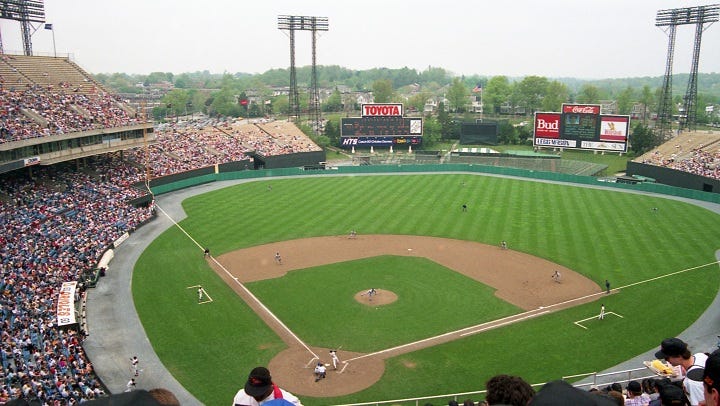
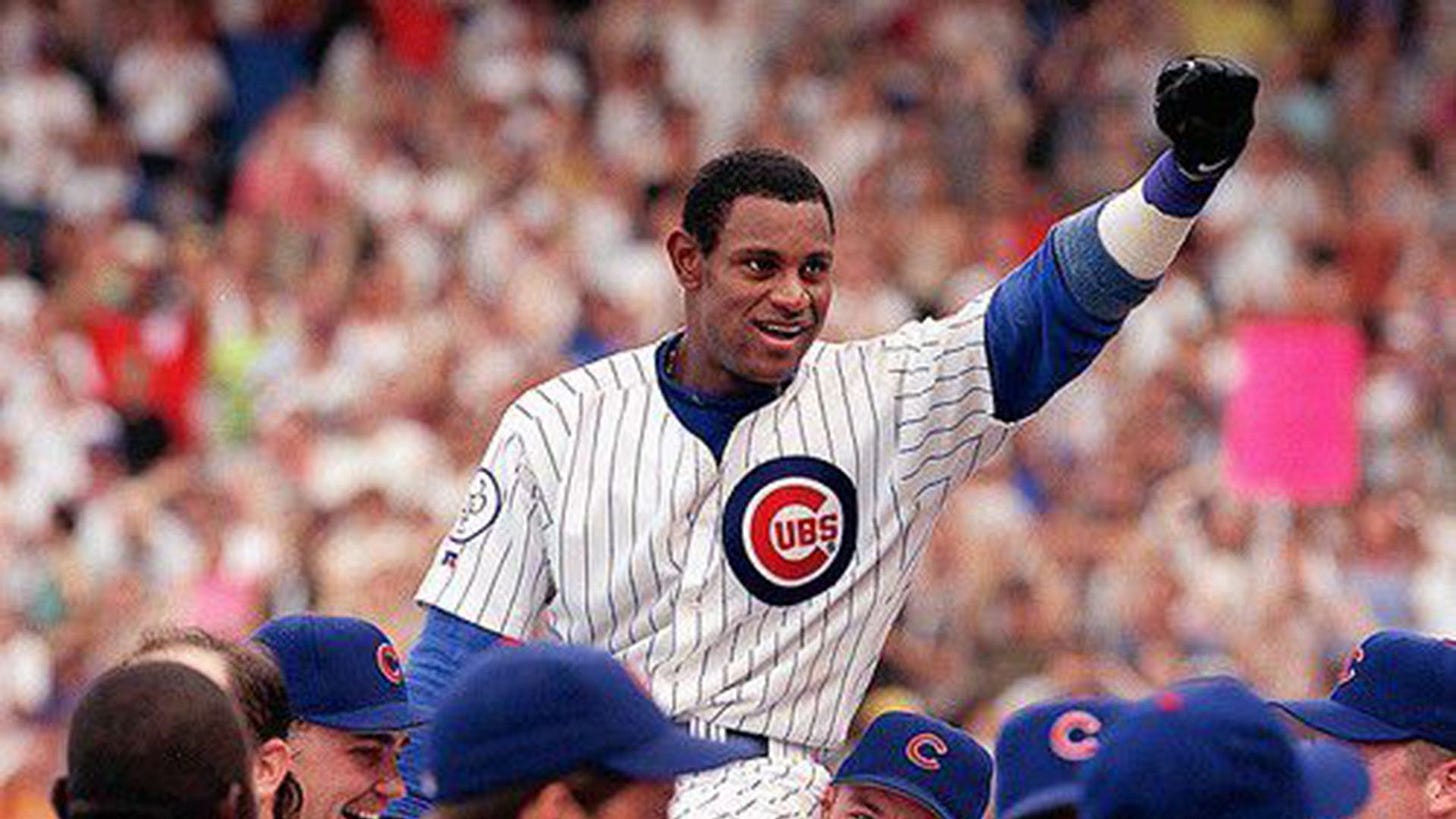
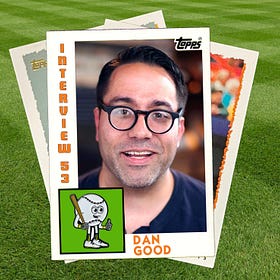
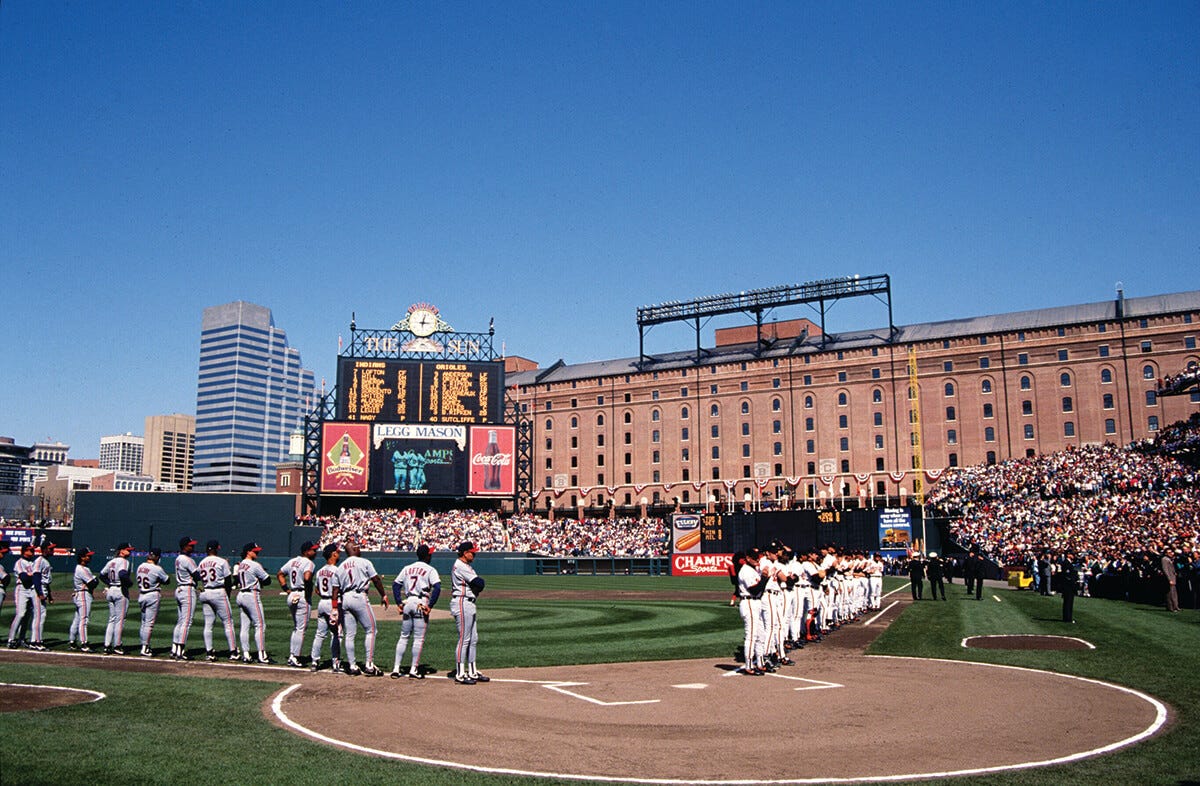

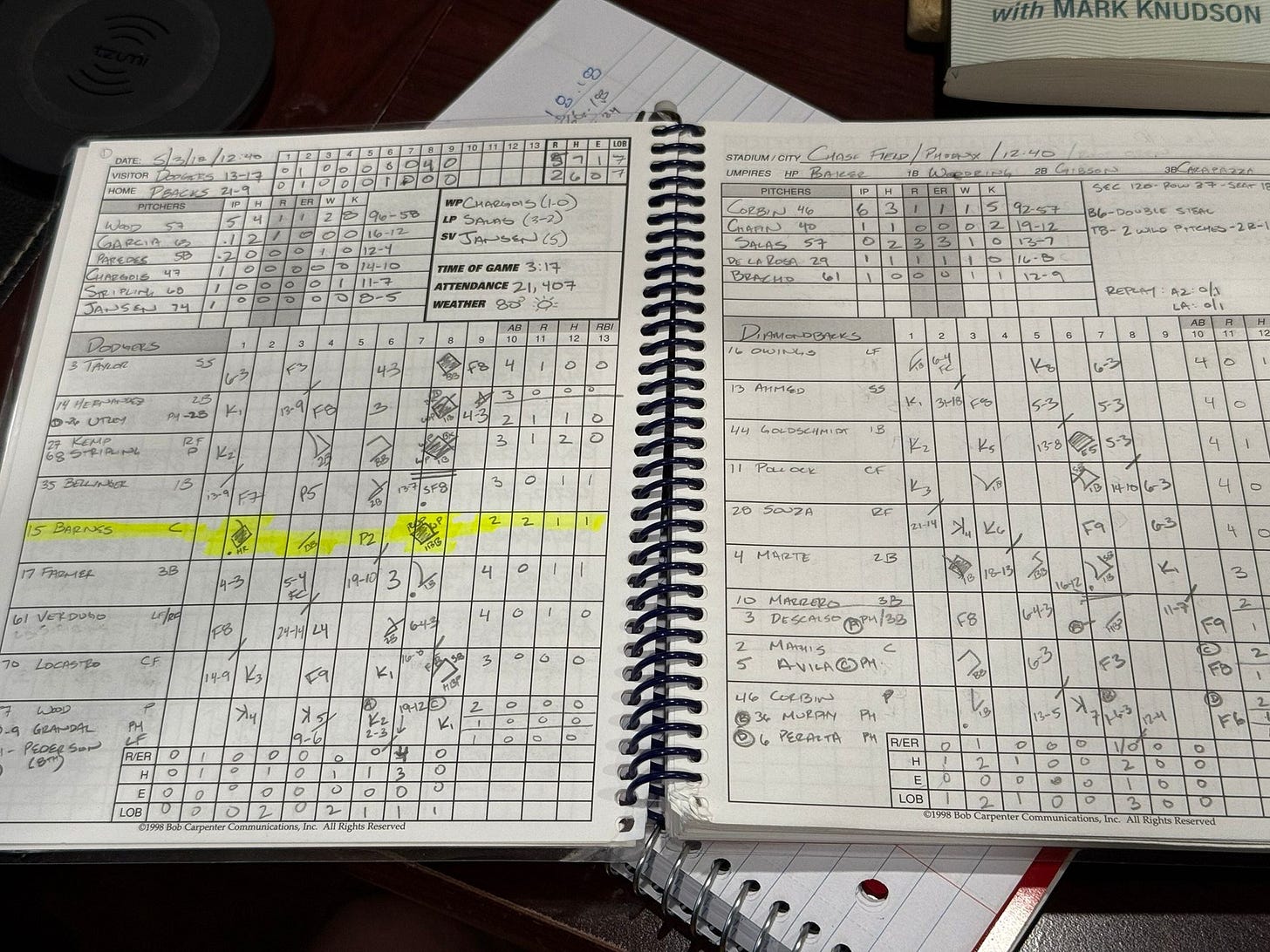


This was great! I've been fascinated by keeping score and just never got a chance to learn/do it. I'm going to explore her website now (and of course follow) to see if I can start! I love these interviews!